Charity begins at home; shouldn't we solve our own problems before helping others?
This article is part of a series addressing common concerns about charitable giving.
See also: Should Charity Begin at Home?
Charity begins at home; shouldn't we solve our own problems before helping others?
As individuals, we are not able to help everyone in need and so we must make difficult decisions about where we use our resources. One way of making such a decision might be to favour people who live locally. After all, there’s no shortage of people --- even in the wealthiest countries --- who need and deserve our help. We may be especially well-placed to attend to the needs of those near to us. Yet, while there may be some benefits to making local donations, it is in general vastly more cost-effective to support interventions in low-income countries.
The proverb "charity begins at home" is often mistaken for scripture. The Bible does emphasise the importance of helping those nearest to us: "Anyone who does not provide for their relatives, and especially for their own household, has denied the faith and is worse than an unbeliever."1
The phrase "charity begins at home" was popularised in the 17th century by Thomas Fuller, a British clergyman and historian. However, Fuller's meaning is often misinterpreted today. He didn't mean that we should only help those near to us. His full text states: "Charity begins at home, but should not end there" (emphasis added). In other words, we should nurture a sense of compassion and generosity in our relationships with those around us, but we should then work to extend that compassion and generosity to the rest of the world.
Helping those near to us and helping those who are far away are not mutually exclusive. We can do both; it's just a matter of striking the right balance. We've not found that balance yet. For example, according to the 2023 Giving USA report, only 6% of American donations went to international affairs organisations in 2022. This is consistent with cross-cultural research on generosity. A 2014 study conducted in Germany and China found that subjects in both countries were willing to forego greater sums of money to help those nearer to them than those farther away.
Figure 1. Subjects' generosity decreases as social distance increases.

Graph produced by Strombach et al. (2014).
In some cases, giving within your home country might make sense. If you live in a low- or middle-income country, there might be highly impactful giving opportunities in your community that you are well-suited to identify (see our guide to evaluating charities). If you live in a high-income country like the U.S., it might make sense to give domestically depending on which cause you are interested in supporting. For example, if you are interested in advancing climate policy, it makes sense to work in a country where some of the largest corporations are located.
Most of the time however, if you live in a middle- or high-income country, you can maximise the impact of your dollar by sending it to a lower-income country. For $619, you can increase a household's income in the U.S. by about 1%. For $547, you can double the income of a household in Kenya. In fact, for each dollar spent, those who live in wealthy countries can expect to do at least one hundred times more good for those in low-income countries than they could for themselves. Giving What We Can Co-Founder William MacAskill calls this principle the "100x multiplier."
Charity might start at home, but it has a much greater impact when extended around the world.
You can direct your giving overseas by donating to one of our many recommended charities that work internationally. You can also donate to EA Funds' Global Health and Development Fund, which aims to improve people's lives in the poorest regions of the world.
Consider making a giving pledge and joining our worldwide community of like-minded people who are working to make the world a better place.
This post is part of our Common Concerns About Donating to Charity page. Multiple authors contributed.